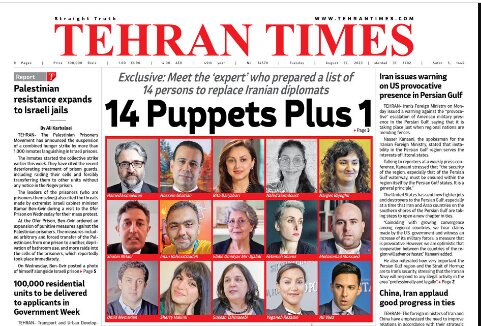Iman Rahmatizadeh responds to report by Tehran Times

Rahmatizadeh’s response: In reference to the article published on 22nd of August 2023 in your newspaper, where my name was mentioned alongside a few others as "Puppets of the U.S. Government", the following response is provided by me, and either the English or Persian version is expected to be published under the criteria defined in material 23, Press Law:
Firstly, I am completely unaware of this article and the accusations it contains. I am surprised as to how and from where you landed on my name, nor do I have any connection with or know the individuals mentioned in the article. I can also assume they do not know me either. In terms of my personal political beliefs, I am quite distant from the majority of those listed (and likewise from the political beliefs of your newspaper).
Secondly, I am not a political activist and have no experience in diplomacy to involve myself in such projects (assuming the validity of your content). I am actively working at Google in an engineering management and software engineering capacity. Alongside this, I voluntarily strive to reduce the impact of the unjust digital sanctions by the U.S. Treasury on Iranian users, trying to make Google’s services accessible to all Iranians. Associating me with any activity leading to Iran's isolation and increasing sanctions does not align with my background.
Thirdly, my personal political belief has always been towards the genuine reformist mindset; a mindset that is people-centric rather than authority-centric, seeking constant, step-by-step improvements, and at the same time, candidly and fearlessly speaking up to those in power without crossing its own red lines. Red lines that I learned from great but imprisoned role models like Mostafa Tajzadeh and Mohammad Reza Jalaeipour; red lines like working with a foreign government to influence Iran's internal political matters, assisting any threats to the territorial integrity of our beloved country, and supporting sanctions or policies that increase the suffering of our people. You have accused me of actions that clearly cross my red lines.
Fourthly, I have benefited from free education in Iran for years and consider myself indebted to the people who financed my education and growth through their oil revenues and taxes. Therefore, I am keen on sharing my learnings from successful companies like Google to my colleagues in Iran. Considering how the content in your newspaper is flawed in both quality and credibility, I would be happy to offer solutions for better quality control before publication, and also assist in a post-mortem and root cause analysis of such errors to plan for their prevention in the future. Both will aid in the growth and improvement of your newspaper which is also funded by the same oil money and taxes from Iranian people.
In conclusion, while the law grants me the right to take these allegations to court, I believe that freedom of speech and the sanctity of the media are so important yet neglected in our society that I would forgo my personal right and emphasize only the publication of this response in your newspaper. I hope that this helps you, your colleagues, and those who share your mindset someday become such strong supporters of freedom of speech and respect for the media that our society can overcome this unfortunate magnitude of corruption, problems, and inefficiencies.
Tehran Times’ explanations:
1- It is important to first mention that despite claims by Iman Rahmatizade, the Tehran Times has not received any letter or response. Via a third party, the Tehran Times has asked Rahmatizadeh to send a direct email to the newspaper. No response has been received to this day. This is while Rahmatizadeh claims to have responded to the Tehran Times via a website called Sana. Perhaps, years of distance from Iran means Rahmatizadeh is not familiar with the country’s proceedings, but Sana is a judicial portal and not a website meant to be used to send letters to media outlets.
2- The Tehran Times' report, which listed Rahmatizadeh among the 14 individuals who were meant to replace Iranian diplomats abroad, was accurate. If we assume that Rahmatizadeh’s claims of having no connections to the group is truthful, that means Ali Vaez included him in the list without his own knowledge. Though the Tehran Times believes it is very unlikely that Rahmatizadeh was not aware of his inclusion, he should be turning to Vaez for answers and not the media.
3- Rahmatizadeh claims he would not cooperate with foreign forces against Iran under any circumstances. Tehran Times welcomes such an attitude and deems it positive. Hopefully, Rahmatizadeh remains committed to what he says in practice.
4- Regarding Rahmatizadeh's pseudo-ethical preaching, the Tehran Times would like to mention only one fact: reality cannot be changed by running away from it or trying to point the finger at others.
